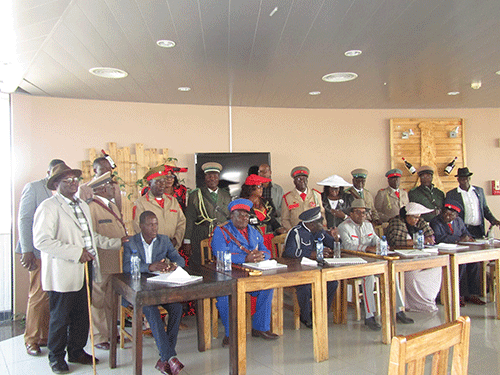Various Ovaherero and Ovambanderu chiefs vowed on Friday to step up their fight against Germany by appealing for assistance from African nations as well as well-meaning progressive international solidarity groups.
“We, as descendants of the victims of genocide, are left with little and few options but to intensify our campaign by any means necessary, including appealing to our African brothers and sisters on the continent and in the diaspora as well as well-meaning progressive international solidarity groups,” said the Chief’s Assembly spokesperson Mbakumua Hengari during a media briefing here on Friday.
He said the chiefs’ action was necessitated by recent media reports in Germany reporting that the European nation rejected to renegotiate the offer to aid projects in Namibia over 30 years to atone for its role in genocide and property seizures from 1904 to 1908.
Deutsche Welle (DW), the German state-owned international broadcaster, reported a fortnight ago that the German government has now officially rejected the renegotiation demands.
“From the German government’s point of view, the negotiations for the joint declaration with Namibia have been finalised, even though talks about specific modalities of its implementation are continuing,” Deutsche Welle reported.
The German government said this while responding to questions posed by a member of Germany’s federal parliament from the socialist Left Party, Sevim Dagdelen.
Hengari said since the beginning of the demand for reparations by the descendants of the victims, both our Namibian government and its German counterpart were initially hesitant.
“With our government reluctantly buying into the demand, if it ever did so with any conviction, at a later stage when then President-elect Hifikepunye Pohamba joined the centenary commemoration at Ohamakari in August 2004,” he added.
“But with regard to the German government, we have never had any illusion about its aversion – if not total aversion – to the mention of genocide and reparations,” he said.
Thus, he said before the centenary commemoration of the genocide in 2004, the Evangelical Lutheran Church in Namibia, especially its German congregation, the Evangelisch–Lutherische Kirche, in Namibia started to float the idea of a reconciliation fund.
“It is not difficult where this idea must have come from; obviously from the German government through its various German networks in Namibia,” he said.
Hengari stated that following the Ohamakari commemoration in August 2004, then German federal minister for economic development and cooperation Heide Marie Wieczorek-Zeul, who attended the commemoration, initiated the Special Initiative when she returned home.
“We all know, including members of the Namibian media, the track record of the Special Initiative. In fact, to this day, no known report about it exists, or has been publicly released. Such reports, if any, to this day, remain a highly guarded secret between the two governments of Namibia and Germany,” he said.
“Fast track this to 2021 and the two governments have in place the Joint Declaration, which is nothing but the reincarnation of the Special Initiative,” he added.



